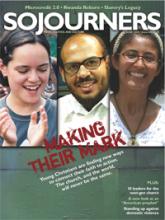This spring, when inflammatory comments by Rev. Jeremiah Wright—Sen. Barack Obama’s retiring pastor—dominated talk radio, TV, and the blogosphere, race once again surfaced as a front-burner issue in the 2008 run for the presidency. From slavery to segregation, America’s tragic past demands a robust theological account. As we reflect on race in the 21st century, it is vital that we turn once again to a great prophet of racial justice of the early 20th century, W.E.B. Du Bois. Edward Blum’s thoughtful and readable W.E.B. Du Bois: American Prophet is vital to not only thinking, but theologizing, through our current moment, where we are witnessing the advent of an anti-racist/pro-reconciliation prophetic Christianity in North America.
While the Civil War solved the problem of slavery in the United States, the problem of racism rages on in American public life. In his earlier work, Reforging the White Republic: Race, Religion, and American Nationalism, 1865-1898, Blum argued that after the Civil War the country reconstituted itself in whiteness. This led to the cultures of segregation and lynching that Du Bois critiqued in the late 19th and early 20th century.
Read the Full Article
